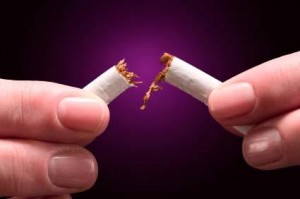 Unfortunately, we can’t live in our parent’s blissful ignorance anymore. And it’s not news that smoking is bad for your health.
Unfortunately, we can’t live in our parent’s blissful ignorance anymore. And it’s not news that smoking is bad for your health.
If you are a smoker, quitting isn’t as easy as cutting out sugar or making a commitment to walk three times a week.
That’s why we’ve compiled a list of realistic ways to stop smoking. We aren’t talking quitting as a New Year’s resolution. We mean making an actual lifestyle change. So if you wake up on February 2and decide that is the day to quit, don’t let the fact that the New Year has passed stop you from making this change in your life.
Nicotine Replacement Therapy
Quitting smoking can be overwhelming because nicotine is incredibly addictive. Being able to wean yourself off nicotine, without the harmful effects from carcinogens, can help raise your chances of not giving up on day one. Using patches or gum helps you fight cravings by getting a measured amount of nicotine. Both nicotine replacements have different dosages, so you can slowly cut back the amount of nicotine intake.
Prescription Drugs
There are many prescription drugs that can help you quit smoking. Some of the prescriptions are used along with nicotine replacement therapy, while others you need to start taking before “Quit Day.” These drugs help counteract certain chemicals in the brain to help ease cravings. As with all prescription medications, make sure you consult your doctor and are aware of any potential side effects.
Write It Down
Write down all of the reasons you want to quit smoking on notecards or on your phone. Is it for your children or to stop having to hide your habit? Anytime you’re feeling particularly weak, bring that list out. Remind yourself there is a good reason why you’re doing this, and that in time it will get easier.
Acupuncture
You may know that acupuncture is often used to relieve medical ailments, but did you know it also might help you kick the habit? Treatments focus on jitters, cravings, irritability, and restlessness—all symptoms that commonly plague people who are trying to cease smoking.
Make a Plan
Do you know when you’re most likely to smoke? Make a plan to do something else during the times you would usually light up. Is it after dinner? Try making a hot cup of green tea instead. Is it after work? Go for a walk. Is it with a cup of coffee? Take a cup of coffee with you on a walk. Other methods that may help are to keep your mouth busy: chew gum, snack on sunflower seeds, always have a drink like flavored water or tea.
Read more about how smoking may increase breast cancer risk.










